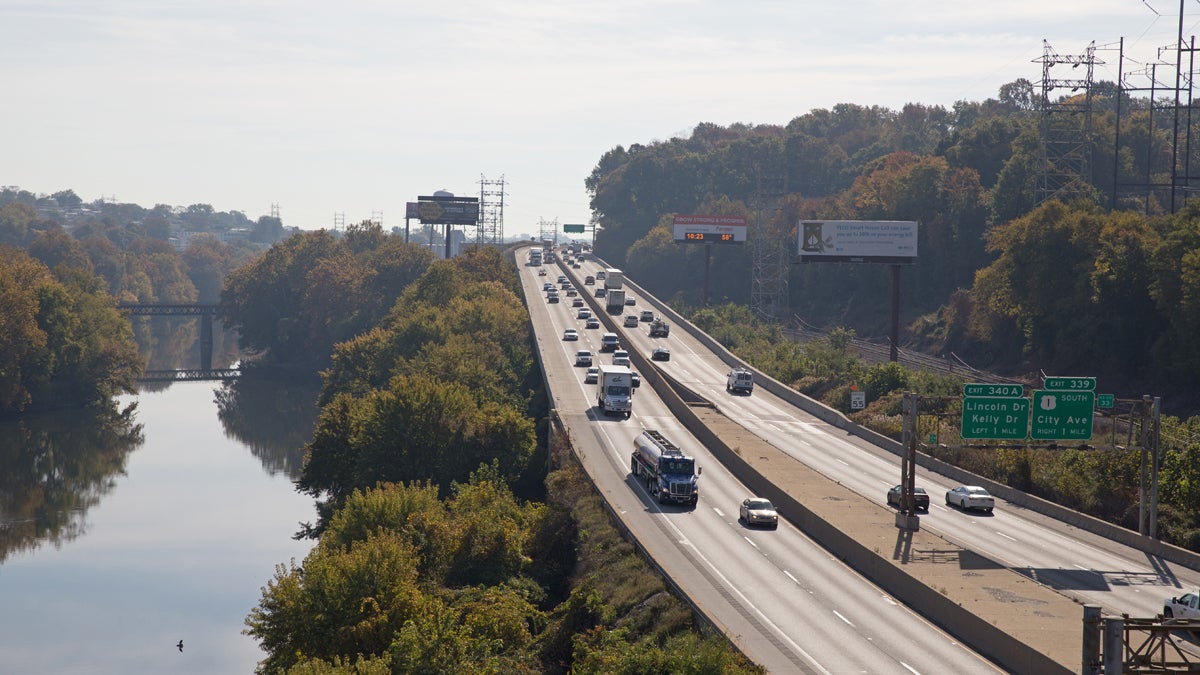Mayors to states: Help or get out of the way

Drivers travel on the Schuylkill Expressway in Philadelphia, Pa. Nearly half of mayors in the 2015 Menino Survey said one of the most challenging issues to their city that should be a state and/or federal matter was infrastructure. (Lindsay Lazarski/WHYY)
The 2015 Menino Survey of Mayors focused on infrastructure, policing, poverty among other issues facing cities nationally.
The U.S. Conference of Mayors met last month in Washington, D.C. Mayors from cities with more than 30,000 residents gathered to trade ideas, network and propose opportunities for collaboration.
Pennsylvania had a good showing of mayors, including Allentown’s Ed Pawlowski, who attended the conference in leiu of the city council’s unanimous vote to call for him to resign.
The Boston University Initiative for Cities undertook, for the second year, the Menino Survey of Mayors. Named for former Boston mayor Thomas Menino, the survey tries to quantify national mayoral opinion. The group interviewed 89 mayors, mostly from cities with at least 100,000 residents. The results reflect the issues of importance in many Pennsylvania cities.
Here are the big takeaways.
Roads, bridges and mass transit
Let’s see how well you compare with the country’s mayors in answering this question: “Think about the next five years and beyond. What one trend or issue that you primarily think should be a state and/or federal matter will pose the biggest challenge to your city?”
If you answered infrastructure (or read the subheading of this section) you agree with nearly half of the mayors.
“For an open-ended question, it was startling that the answers were so overwhelmingly geared towards infrastructure,” said Katharine Lusk, executive director of the Initiative for Cities and editor of the report. “That speaks to the frustration of mayors, but also the prolonged delay of comprehensive legislation.”
President Obama addressed the mayors (and this issue) during the conference, saying “There’s not a mayor here who can’t reel off 10 infrastructure projects right now that you’d love to get funding for, and that would put people to work right away and improve your competitiveness, and help businesses move their products and help people get to their jobs.”
Unfortunately, a majority of mayors think that’s all talk, expressing “no confidence” in the state and federal government to provide the help cities need — whether infrastructure was the biggest concern or not.
As you can see from our series on bridges, infrastructure concerns plague Pennsylvania cities.
Municipal financial health
Part of the survey asked respondents how they would handle a financial deficit or decline, and what sort of tough choices they’d be willing to make. Perhaps there are some cities where that’s a hypothetical discussion, but the six options presented have all been tried in different cities across Pennsylvania.
The choices were to raise property taxes, privatize city services, eliminate city services, reduce city staff, raise other taxes and fees, or renegotiate union contracts.
As one mayor wrote, “I would be least likely to raise property taxes. I’ve done just about everything else.” (The responses were anonymous, but that sounds like a distressed Pennsylvania city to me.)
Most mayors agreed with that response, saying they were least likely to raise property taxes, followed by privatizing city services and eliminating city programs.
State and federal assistance
Mayors would like the state and federal governments to either help or get out of the way. Most feel that those entities are more likely to simultaneously hinder and interfere.
City leadership is distinctly pessimistic when it comes to their relationship with the state governments: a majority of mayors surveyed felt they received less or much less state funding than the average city. They also overwhelmingly agreed that state laws restrict the city-level autonomy they need to govern.
The biggest change that mayors would implement would be the ability to modify local revenue options or the local distribution of revenue.
“We were surprised by the level of rancor that cities felt towards their states, regardless of political affiliation of the mayor,” said Lusk. “Not only do they feel that their hands are tied, but when they try new things, their hands are tied again by the state.”
Despite this bad blood, cities are most likely to partner with the state on projects across all policy areas. That seems to be a relationship borne out of necessity: when asked about voluntary or discretionary partners, mayors said they tend to work with the business and nonprofit community.
The respondents felt more kindly towards the federal government, though a majority still felt they received less funding than the average city. Federal laws are perceived as restricting autonomy less than state laws.
But that doesn’t mean mayors don’t have some suggestions for what they’d like to see change on the federal level, particularly EPA regulations. Across party lines, 14 mayors spoke out against increasing EPA regulations without an accompanying increase in funding assistance to enforce them.
Mayors also wanted less federal regulation around gun laws, immigration and marijuana legalization.
Ten (highly content) mayors couldn’t think of any federal laws they’d like changed.
Love for the city of brotherly love
When asked which cities they look to for inspiration, 13 percent of respondents said Philadelphia. Philly tied with Los Angeles for third most inspirational city, after New York and Chicago.
Mayors picked those cities because of specific policies, because the city was similar to theirs, or because they knew the mayor personally.
Interestingly, 23 percent of mayors surveyed (who govern cities of, on average, nearly 300,000 people) said there were lessons to be learned from smaller cities around the country.
WHYY is your source for fact-based, in-depth journalism and information. As a nonprofit organization, we rely on financial support from readers like you. Please give today.


